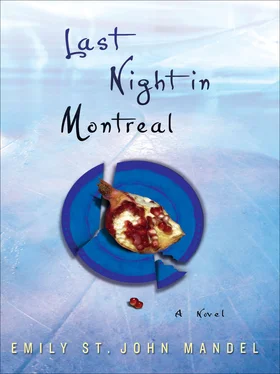“But I just lost my job.”
He had nothing to say to this.
“By traveling,” she said, “you mean following Lilia?”
“Yes. It’s an open case.”
“There isn’t a retainer? You said once there’s always a retainer when you’re following someone.”
“It ran out a while ago. The contract expired.”
“There’s something that I don’t quite understand,” she said.
He glanced up briefly, and then down at his soup. She was making him uneasy. He reached out with his left hand and his fingertips passed nervously over the smooth handle of his walking cane, leaning against the table by his side.
“What’s that?” He lifted the glass of water a few inches, changed his mind, lowered it to the table again, and adjusted his napkin on his lap.
“Why you’re still following her.”
“She’s an abducted child,” he said. “That’s what I do .”
“An abducted child? Do you know how old she is?”
He swallowed a spoonful of soup and chased it with a sip of water. He set the glass down on the table and then, with a thumb and two fingers, moved it carefully an inch to the left.
“Of course I know how old she is,” he said quietly. He didn’t take his eyes from the glass. “I know almost everything about her.”
“She’s two months older than I am. Do you know how old I am?”
A spoonful of soup was halfway to his mouth; he lowered it back into the bowl and touched a corner of napkin to his lips.
“You’re my daughter,” he said.
“It seems very strange to me,” Michaela continued, very quietly now, “that you would chase a twenty-two-year-old woman to Chicago. She was abducted quite some time ago, wasn’t she?”
“Don’t,” he whispered. He wanted to explain it to her: the cufflink he’d found on the floor that morning, that tie on the floor of the closet, the way Elaine had sometimes looked at him when he got into bed at night, with such contempt, as if he couldn’t find a lost sock, let alone a missing child, but it came to him suddenly that it was years too late.
“You’ve been chasing her since we were both eleven years old,” said Michaela relentlessly. She felt giddy and dangerous, slightly drunk, and she couldn’t stop talking although she knew she should. “And now she isn’t a child anymore. Not that that negates the crime, but then, if you were trying to solve the crime, you’d be chasing her father, wouldn’t you?”
He didn’t speak. A muscle in his jaw worked uselessly, and his face was slowly turning red.
“You’d be chasing Lilia’s father,” she said, “except that you’re obsessed with Lilia. And I wish you’d just admit it.”
“Admit what?” His voice was a croak.
“That you want to fuck her,” Michaela said.
It would have been difficult to predict what happened next. He had, after all, never even hit her. But then the glass in his hand was abruptly airborne, almost of its own volition; he couldn’t remember deciding to throw it. He watched the trajectory unfold in slow motion, the girl in the gradually-becoming-clearer line of flight, the intersection of her forehead with the edge of the glass, her backward fall, the sound she made. His cane was in his hand, although he couldn’t remember having reached for it; he made his way around the table and saw her lying still and white in the overturned chair. There was blood on her forehead. He was aware in that instant of nothing but color and light: the deep-blue evening behind his ghostly reflection in the dining room windows, and fragments of light from the chandelier caught in the broken angles of glass, spilled water. He had shocked himself. He reeled backward, touched the wall with his hand and slid down it. He was clutching his cane with both hands, white-knuckled. The room was moving like a boat on rough water.
When he opened his eyes she was staggering to her feet, bleeding from the forehead, backing up and clutching the table. She swore softly and spat at his feet. She left the room like a sleepwalker, leaning to the right. The door slammed. He heard her fall once on the gravel outside, her receding stumbling footsteps, and then silence. The room had stopped spinning in her absence, but everything was too bright. He sat still for a long time, looking at the way light caught in the angles of broken glass and spilled water and along the glinting handle of her soup spoon, on the varnish of her chair lying on its back, in a smear of blood on the hardwood where she’d fallen.
“I’m sorry,” he said. He wasn’t sure if he was talking to himself or to his ex-wife; he talked to Michaela’s mother sometimes, the old Elaine, the circus Elaine who hadn’t disappeared yet, before they were detective and real estate agent and before Michaela was even born, playing on the midway before the show opened, riding together in the house trailer from town to town and looking out the windows at the prairie passing by, holding hands in the shadows behind the tent. It hadn’t really been so bad in retrospect, traveling around like that, and he found himself speaking to her sometimes in moments of disarray. He stood up unsteadily and returned very slowly to his side of the table, leaning heavily on the cane as he sank into the chair and lifted his spoon. He found himself looking at the spoon for several long minutes, almost unsure what to do with it, but he eventually resumed eating his soup.
Erica was outside Lilia’s apartment in the morning. The last morning, the day Lilia left Chicago; she stepped out with her suitcase and Erica was there on the sidewalk, blue-haired and shivering in an old velvet smoking jacket the color of peaches. She was leaning against the side of the building, staring at her feet, or perhaps her eyes were closed — her hair fell over her face — and Lilia had the impression that she’d been standing there for some time. The lines of her shoulders spoke of exhaustion and night.
Lilia said her name, and she looked up quickly with swollen eyes.
“It’s so early, Erica, what are you—”
“I don’t want you to leave.”
Lilia set down her suitcase. Erica took a cautious step toward her, stumbled forward and was suddenly in Lilia’s arms. She was wearing perfume; she smelled like roses and cigarettes.
“Erica,” Lilia whispered into her blue hair, “Erica, I’m so sorry, I really am. .”
“What’s in New York City?” Erica’s voice was muffled against Lilia’s shoulder. “Why won’t you stay with me? You don’t know anyone there.”
“I’m so sorry, but I have to go.” Erica’s shoulders were shaking now. Lilia held her awkwardly. “You knew I wasn’t staying here long when you met me.” Her own words sounded unforgivable when she heard them, but she closed her eyes and pressed on nonetheless. “You know I always leave again.”
Erica pushed away from her then. She was still crying, but she wouldn’t meet Lilia’s eyes anymore. Blue hair falling over her face. She turned and almost seemed to drift as she walked away down the cracked sidewalk, hands deep in her pockets. An empty, narrow-shouldered figure, hair like tropical water and shadows gathering underfoot, slouching and broken on the predawn street. At the corner she turned left and she was gone then, but it was several minutes before Lilia could pick up the suitcase and turn away from the scene of the crime, and she kept looking back. Half expecting that Erica would come running up behind her, half hoping she would.
Lilia stood at the corner with her suitcase waiting for the light to change, and all she could think of was dancing with Erica last night, when she told Erica she was leaving and at first Erica was acting so hopeful and so adorably brave; she gave Lilia her silver chain necklace to wear—“to remember me by,” she actually said— and it was a while before it warmed to Lilia’s skin. “So you’re finally going,” Erica said, “just like you said you would.” Just like I said I would. I’m sorry. Yes. Tomorrow morning I’ll be leaving. The ticket’s in my pocket. We are almost out of time. Lilia didn’t say, And you’re the first one who ever mattered enough to me to warn in advance that I’m leaving. “Well, good for you,” Erica said. The beginning of the only argument Lilia ever had with her. “I think it’s courageous.”
Читать дальше












